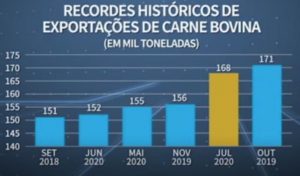Reuters' Doyinsola Oladipo and David Shepardson reported late Thursday that "U.S. dock workers and port operators reached a tentative deal that will immediately end a crippling three-day strike that has…
China Requires Covid-19 Tests on Meats and Calls for Mass Testing of Brazilian Meatpackers
Last week, the National Health Commission of China published a series of guidelines for the meat processing industry from several countries, such as Brazil. One includes the requirement for nucleic acid testing to identify the new coronavirus in fresh products. According to Chinese authorities, companies will have to implement “a complete traceability mechanism to strictly prohibit processing that does not meet the country’s animal quarantine regulations or food safety standards.” Since the end of June, the Asian country has suspended some meat industries in Brazil and other countries that have cases of the disease among employees.
Globo Rural writer Cleyton Vilarino reported that the Chinese document also requires the disinfection of processing and slaughter environments after each shift, in addition to other hygiene measures, such as changing workers’ clothes and equipment and disinfecting surfaces and items in common use. In relation to the safety of workers within meat processing units, the National Health Council of China has stipulated a minimum distance of one meter between employees in all processing areas, in addition to the use of masks, gloves and other protective equipment.
Medida consta em documento com diretrizes para o controle da doença publicado pela Comissão de Saúde do país nesta quinta-feirahttps://t.co/idCC8kU7VP
— Globo Rural (@Globo_Rural) July 25, 2020
During a live broadcast of the Brazil-China Business Council meeting, the advising minister of the Chinese Embassy in Brazil, Qu Yuhui, said that, although there is no scientific evidence of transmission of the new coronavirus through the consumption of food, there are indications that the packaging may be linked to contamination.
On Thursday, Valor Econômico writer Rafael Walendorff noted that the diplomat reinforced that the blocks are temporary and will not impact the commercial relationship between the two countries – five Brazilian units are prohibited from exporting due to cases of Covid among employees.
“It is a preventive or anticipatory measure so that there is no systematic impact on our effort to combat covid-19. At this moment, we think that any care is not too much so that the effort is not wasted and there is no systematic impact on our trade in the future,” said Yuhui.
China recently allowed the import of one of the six Brazilian meatpackers that have had sales suspended in recent weeks.
“Brazil has 102 slaughterhouses enabled. This will not have a substantial impact on our trade with Brazil,” defended the Chinese diplomat.
On the other hand, Brazil sees losses and maintains the perception that the blocks are unjustified. In an interview with Valor Econômico, the secretary of Commerce and International Relations of the Ministry of Agriculture, Orlando Ribeiro, said that the suspensions may not impact the total volume exported by Brazil every year, but have negative effects on the production chain.
In the opinion of the Minister of Agriculture, Tereza Cristina, there are exaggerations in the disclosure of cases of Covid-19 in meat industries:
“The reverberation is often greater than the fact. This is a big concern because, when you distort information and it gets out abroad, we have problems with it,” said Tereza, during a webinar promoted last Tuesday by the Jota website.
In addition, the president of BRF, a Brazilian multinational food company, Lorival Luz, said he does not know of another country that has taken so many control measures over Covid-19 in its meat industries.
“At BRF, for example, we tested more than 50,000 people and installed 10,000 meters of acrylic structures to protect employees,” he said during a live interview with the coordinator of FGV Agro, Roberto Rodrigues, last Wednesday, according to Agência Estado.
China wants zero risk of contamination by Covid-19 in Brazilian meat exports and calls for mass testing in meatpackers, the Brazilian embassy in Beijing told Itamaraty, in a document published by Canal Rural.
China quer testagem em massa em frigoríficos do Brasil para não haver contaminação em carnes https://t.co/NfqIsj4BhF
— Canal Rural (@canalrural) July 25, 2020
Canal Rural writers Paola Cuenca and Felipe Leon reported that the request would have been made during a videoconference by the director general of the Bureau of Safety of Imported and Exported Food of the General Administration of Customs of China (GACC). The article noted that the Chinese will not accept continued exports of plants that keep employees on suspicion of contamination.
Meanwhile, Brazilian beef exports continue to accelerate and may be the second highest July in the historical series. As of the third week of this month, according to data from the Foreign Trade Secretariat (Secex), exports totaled 95.3 thousand tons, an average of 7.3 thousand tons per working day.

Canal Rural writer Felipe Leon reported that if this speed is keeps up until the end of the month, the volume shipped would be around 168 thousand tons. The result would be a record for July and the second largest in the historical series, behind only October 2019.





